|
|
|
Sort Order |
|
|
|
Items / Page
|
|
|
|
|
|
|
| Srl | Item |
| 1 |
ID:
096595
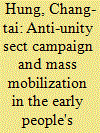

|
|
|
|
|
| Publication |
2010.
|
| Summary/Abstract |
The anti-Unity Sect campaign (1949-53), a precursor to the Campaign to Suppress Counterrevolutionaries (the zhenfan movement), was one of the Chinese Communists' most violent policies to root out a perceived evil cult in China. This article argues that the drive was never simply a religious crusade. It was essentially a mass mobilization for the purpose of consolidating the Communists' power and legitimacy. Through a host of propaganda channels, including media attacks and public trials, the Communists dealt a crippling blow to the sect. The mobilization campaign turned many citizens into supporters and agents of the government, and its tactics would soon be mimicked in subsequent political movements.
|
|
|
|
|
|
|
|
|
|
|
|
|
|
|
|
| 2 |
ID:
099869
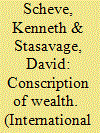

|
|
|
|
|
| Publication |
2010.
|
| Summary/Abstract |
The dominant narrative of the politics of redistribution in political science and economics highlights the signature role of the rise of electoral democracy and the development of political parties that mobilize working-class groups. We argue in this article that this narrative ignores the critical role played by mass warfare in the development of redistributive public policies. Focusing attention on the determinants of progressive taxation, we argue that mobilization for mass warfare led to demands for increased taxation of the wealthy to more fairly distribute the burden for the war effort. We then show empirically that during the past century, mass mobilization for war has been associated with a notable increase in tax progressivity. In the absence of war, neither the establishment of universal suffrage, nor the arrival of political control by parties of the left is systematically associated with large increases in tax progressivity. In making these arguments, we devote particular attention to a "difference-in-differences" comparison of participants and nonparticipants in World War I.
|
|
|
|
|
|
|
|
|
|
|
|
|
|
|
|
| 3 |
ID:
163448
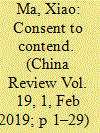

|
|
|
|
|
| Summary/Abstract |
�is study explores how local o�cials tolerate and use mass mobilization to extract policy concessions from above. Local o�cials strategically tolerate mass mobilization when the demands of the masses are
congruent with elements of their own agenda that they are otherwise
unable to pursue. Protestors in the streets turn out to be a powerful
bargaining chip for local o�cials: they illustrate ex ante that higher
level leaders risk causing social instability if they reject the masses’
demands. �e article lays out the institutional environment that gives
rise to such a strategy, presents a detailed case study focusing on the
|
|
|
|
|
|
|
|
|
|
|
|
|
|
|
|
| 4 |
ID:
110219
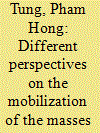

|
|
|
|
|
| Publication |
2011.
|
| Summary/Abstract |
This study re-examines participation of the masses in the revolutionary high tide of 1930-31 in Vietnam. In a departure from previous studies, it does not consider the main cause of the involvement of peasants in the protest movement to have been either the deteriorating economic circumstances of the masses or political manipulation on the part of the communists. Approaching the movement from a politico-cultural perspective, the author points to traditional factors that exerted a strong influence on the political attitude of the peasants and motivated their participation in protest movements during the colonial period. The author also uses newly unearthed historical documents to reinterpret the role of the Indochinese Communist Party in the revolutionary high tide, comparing its strategy and tactics in mobilizing the masses with those of other groups that formed part of the 'Westernized elite'. The study not only introduces new historical facts to the debate, but also presents new ways to understand the political protests of the masses in modern Vietnam.
|
|
|
|
|
|
|
|
|
|
|
|
|
|
|
|
| 5 |
ID:
142169


|
|
|
|
|
| Summary/Abstract |
In July 2013, the cover of Time magazine announced that Egypt has both the world's “best protesters” and “worst democrats.”1 In the same month, the cover of The Economist asked, “Has the Arab Spring failed?”2 The media oscillated between euphoria over the democratic potential of “Facebook revolutions” and dismissal (or even gloating) when they did not seem to pan out. This response to the Arab uprisings is part of a broader trend. Popular accounts of mass uprisings tend to label them neatly by color (orange, green, rose) or season (spring, winter). They give an oversimplified portrait of mass mobilization as teleological: Protests are “successful” if they quickly bring about a stable democracy, and “failed” if they do not. This is often matched by a fascination over whether protesters are “like us” — by their use of social media, rejection of extremism, embrace of Europe and free markets, or hatred of dictatorship. Indeed, debates about the success or failure of mass uprisings often reflect a problematic obsession with the question of whether protesters are “ready for democracy.”
|
|
|
|
|
|
|
|
|
|
|
|
|
|
|
|
| 6 |
ID:
098068


|
|
|
| 7 |
ID:
133659
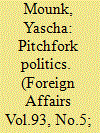

|
|
|
|
|
| Publication |
2014.
|
| Summary/Abstract |
The Tea Party and its European cousins have emerged from the enduring inability of democratic governments to satisfy their citizens' needs. Today's populist movements won't subside until the legitimate grievances driving them have been addressed.
|
|
|
|
|
|
|
|
|
|
|
|
|
|
|
|
| 8 |
ID:
046600


|
|
|
|
|
| Publication |
New York, Palgrave, 2002.
|
| Description |
xii, 260p.pbk
|
| Standard Number |
0312295847
|
|
|
|
|
|
|
|
|
|
|
|
Copies: C:1/I:0,R:0,Q:0
Circulation
| Accession# | Call# | Current Location | Status | Policy | Location |
| 045468 | 958.1045/NOJ 045468 | Main | On Shelf | General | |
|
|
|
|
| 9 |
ID:
146514
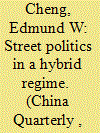

|
|
|
|
|
| Summary/Abstract |
This paper examines the diffusion of activism in post-colonial Hong Kong through the lens of the political regime and eventful analysis. It first reveals the institutional foundations of the hybrid regime that allowed the creation of a nascent movement society. It then explains how the historic 1 July rally in 2003 and a series of critical events since 2006 have led to a shift in scale and the public staging of street politics. A time-series analysis and onsite survey further capture the dynamics that spawned the collective recognition of grievances and reduced participation costs, leading to the Umbrella Movement. While the spontaneous, voluntary and decentralized organizational structure sustained protest momentum, the regime has adopted hybrid strategies to counter-mobilize bottom-up activism. The result is widening contention between the state and civil society and within civil society, or the coexistence of regime instability and regime longevity, a trend that is increasingly common in hybrid regimes encountering mass protests.
|
|
|
|
|
|
|
|
|
|
|
|
|
|
|
|
| 10 |
ID:
107530


|
|
|
|
|
| Publication |
2011.
|
| Summary/Abstract |
Drawing on Clausewitz's classical theory, we argue that the emergence of mass nationalism following the French Revolution profoundly altered the nature of the units constituting the interstate system, thereby transforming the conduct of interstate warfare. To validate these assertions-and thus to test Clausewitz-we rely on quantitative evidence at the macro level, with a particular focus on the global distribution of interstate war sizes, measured in terms of battle deaths, over the past five centuries. Drawing on extreme value theory, we demonstrate that temporal discontinuities in the shapes of the tails of such distributions can be used to draw inferences about the nature of the mechanisms underlying the bloodiest events in world history. This approach allows us to show that the interstate system experienced a fundamental shift in the mechanisms underlying the production of war sizes: a shift that can be dated to the years 1770-1810, and that resulted in a systematic increase in war severity. These same tools also allow us to rule out a number of alternative explanations for this shift (including changes in population sizes and changes in weapons technology), while providing evidence for a specific account of war severity rooted in the mobilizational capacities of states.
|
|
|
|
|
|
|
|
|
|
|
|
|
|
|
|
| 11 |
ID:
190021
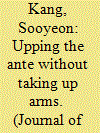

|
|
|
|
|
| Summary/Abstract |
One of the unresolved puzzles in the civil resistance and contentious politics literatures is why some movements that begin seeking limited redress in a certain policy space escalate their claims to demand the ousting of a national leader or the entire regime, a process the article terms ‘demand escalation’. For instance, in the summer of 2019, thousands took to the streets of Hong Kong to protest about a proposed extradition bill that would allow criminal suspects to be sent to mainland China to face trial in courts controlled by the Communist Party. However, even after Hong Kong’s leader, Carrie Lam, announced the formal withdrawal of the controversial bill, protests continued with some calling for greater democracy and others demanding Lam’s resignation. Whereas most of the literature on civil resistance treats demands as fixed and focuses on different methods of struggle to pursue predefined ends, this article shows that demands can change as a result of the state–dissent interaction. The article argues that movements are more likely to escalate their demands when the state responds to the initial nonviolent action with a disproportionate use of force, because such an action intensifies the grievances the protesters have against the state and betrays the remaining trust that people might have had in the government. The analysis of a new quantitative dataset that catalogues both reformist and maximalist opposition campaigns globally supports this claim. By incorporating non-maximalist campaigns into the analysis and not treating demands as fixed, this article adds to our understanding of mass campaigns and highlights an overlooked means by which nonviolent campaigns can up their ante without resorting to violence.
|
|
|
|
|
|
|
|
|
|
|
|
|
|
|
|
|
|
|
|
|